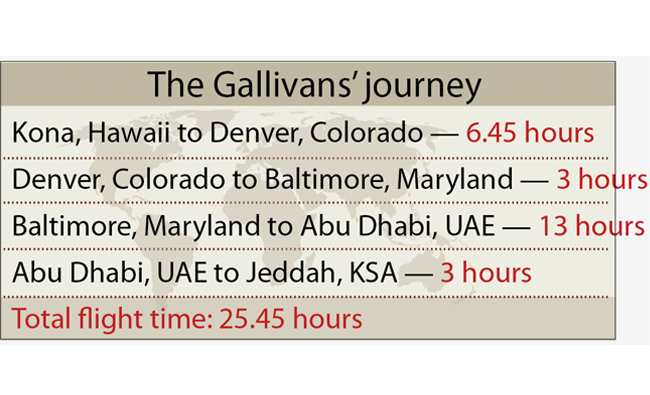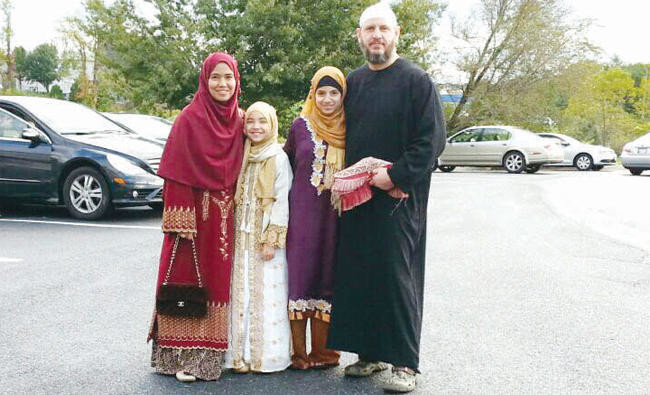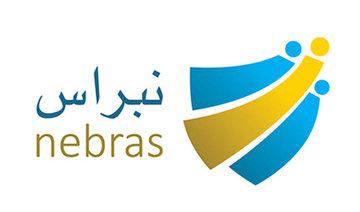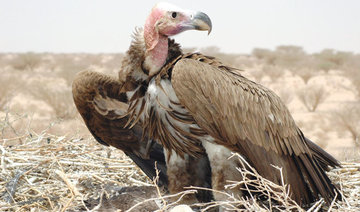LONDON: Each year millions undertake the Hajj journey to Makkah in the religious experience of a lifetime.
Muslims travel from all over the world to Saudi Arabia, but one intrepid young family is traveling further than most in what is one of the longest routes there is to the holy city — from almost 15,000 kilometers away in Hawaii.
Native American Corey Gallivan, his Indonesian-born wife Andhini and their two daughters aged 13 and 15, are set to rack up over 26 hours of flight time on their journey, with several hours wait and drive time in between.
“In the true sense of the word pilgrims, we are really pilgrims,” said Gallivan, with a laugh.
“Many hundreds of years ago, the pilgrims would travel by land and by boat over months. Then it was not uncommon to travel for long periods.” 
Andhini, who is a home-schooling mother, said she has spent many months “making herself at ease” for the Hajj trip, physically and spiritually.
She has spent months going on long walks to prepare herself for the exertion — physically and mentally.
“I believe in mind over matter,” she said. “I’ve been waiting for this for many years. I cried when I received the invite. And what’s even better, I can bring my kids with me.”
Retired government worker Gallivan said: “Hajj is not a vacation, it’s a spiritual event and it’s an invite to rid oneself of material goods and be one with God.”
He added: “My daughters have never done anything like this but I went last year and I became confident that they could come with us.”
Having been granted their Hajj visas from US-government quotas, the Gallivan family will spend 16 days in Makkah and Madinah.
Gallivan carefully selected a travel package from US and Caribbean-based family-owned Sara International Travel. The all-inclusive package cost around $8,000 person ($32,000 for the family and includes five-star hotel rooms, ground transportation, air fares, visa services, Islamic scholar guides, food and Hajj tent accommodations.
Mohammed Sattaur, vice president of Sara International Travel, said competition is heating up in the Hajj tours industry this year, owing to increased supply of tour operators and the issuance of higher country quotas.
“We haven’t needed to run a marketing campaign for the Hajj tour for three or four years; this is the first year that we had to put effort into marketing,” he said.
“It has been more work for us this year but we were able to fulfil our quota. We are taking around 750 pilgrims altogether, with around 70 coming from South America.”
Hawaiians on Hajj: One family’s 15,000 km pilgrimage to Makkah
Hawaiians on Hajj: One family’s 15,000 km pilgrimage to Makkah

Riyadh community reclaims power of writing

- Kitabah initiative for Arabic writers carves out a space for creativity
RIYADH: What would happen if you wrote every day for 100 days? In Riyadh, a growing Arabic writing community has taken on the challenge, inviting writers of all levels to rediscover the joy of writing one day at a time.
The “100 Days of Writing” initiative offers a space for reflection, consistency and expression, far from the pressures of social media.
“Writing is an essential tool for anyone who wants to think,” Mohammad Aldhabaa, founder of the community, told Arab news.
He said that writing can serve as a form of meditation and healing, helping individuals process emotions and better understand themselves.
“There are many things you can do with writing on a personal level, to reflect, to deconstruct identity, and to make sense of experiences, he said.

There are many things you can do with writing on a personal level, to reflect, to deconstruct identity, and to make sense of experiences.
Mohammad Aldhabaa, Kitabah founder
While the community grew, Aldhabaa saw firsthand the challenges Arab writers face online: “We don’t have the infrastructure to allow writers in Arabic to write and publish their work and to reach their audience using modern digital tools,” Aldhabaa explained.
Many writers are forced to rely on fragmented, English-oriented services like newsletter platforms and generic website builders. It is hard to expect consistent, high-quality content in Arabic without a proper system that incentivizes writers, he said.
Out of this need for better infrastructure, the community built its own solution: Kitabah, a publishing platform designed specifically for Arabic writers.
The platform allows users to publish work, create personal websites, and in future phases, monetize their writing.
Kitabah integrates social features to help writers grow their audience without having to independently market their work, similar to Substack or Medium which are useful for writers working in English.
“We didn’t want to create separated islands where each writer builds a blog and struggles to bring in traffic,” Aldhabaa said. “Everything is distributed through the Kitabah feed, and also you have your own website.”
He explained that writers can publish, connect their work to a newsletter, and link their personal site across social media. “There’s a traffic engine behind it, so writers don’t have to do all the heavy lifting.”
Initiatives like this can help shape the Kingdom’s literary and cultural landscape, he said, by empowering more writers to tell locally rooted stories.
“That is very important and crucial, playing into the soft power of Saudi Arabia the ability to have way more writers and creators be able to focus on telling stories about the communities we grew up in, the stories we come from. Because there is something that is very valuable and has very impactful results,” he said.
The community attracts experienced writers and absolute beginners. “We don’t want it to be only seasoned writers who already have a certain level of achievement because the idea of the community is to allow people to try and to learn, and not to create a status-based community.”
Hanen Shahin, a member of the community, said: “The writing community is an alternative environment to the forums we used to write in years ago. Social media came along and made it a competitive space driven by numbers and algorithms, an unhealthy environment for emerging writers, and sometimes even a damaging one.”
Shahin said that writing communities, by contrast, offer the guidance and perspective many writers need.
“You’re not just writing consistently but doing so while receiving feedback from people with refined taste and diverse backgrounds, which gives you a broader view of your work.”
Lana Elsafadi, another member, said: “Writing has helped me know myself better and get better at sorting out my feelings clearly. I feel really good when I can make a helpful comment that shows a deep idea or gives good advice, whether it’s about personal things or work.”
One hundred days may seem a big challenge, but for many writers in Riyadh, it is just the beginning.
Saudi crown prince, Al-Sharaa discuss Syria’s stability and security

- Al-Sharaa thanked Saudi Arabia for its “continued support,” highlighting the Kingdom’s role in strengthening Syria’s territorial integrity and stability
RIYADH: Saudi Crown Prince Mohammed bin Salman and Syria’s President Ahmed Al-Sharaa held a phone call on Sunday, the Saudi Press Agency reported.
During the call, the crown prince and Al-Sharaa discussed the latest developments in the Syrian Arab Republic, and reviewed all efforts to support its security and stability, SPA added.
According to a Syrian Presidency statement, Prince Mohammed “reiterated the Kingdom’s commitment to supporting Syria’s security and stability, encouraging political solutions that preserve the country’s unity, and contributing to its reconstruction.”
He also emphasized Saudi Arabia’s keenness to expand economic and investment ties with Syria in the period ahead, the statement added.
Al-Sharaa thanked Saudi Arabia for its “continued support,” highlighting the Kingdom’s role in strengthening Syria’s territorial integrity and stability.
Endangered vulture spotted in Saudi Arabia’s Northern Borders

- With a 3.1-meter wingspan and weighing up to 14 kilograms, the black vulture is one of the largest of the old world raptors
- Its population numbers have plummeted in the past two centuries because of habitat loss and human activity
RIYADH: An endangered Eurasian black vulture was spotted near the village of Linah in Saudi Arabia’s Northern Borders region, the Saudi Press Agency reported.
The sighting of the bird, which began its migration about 2,000 kilometers away in Armenia, underscores the reserve’s importance as a sanctuary for migratory species.
With a 3.1-meter wingspan and weighing up to 14 kilograms, the black vulture is one of the largest of the old world raptors. Its population numbers, however, have plummeted in the past two centuries because of habitat loss and human activity.
Nasser Al-Majlad, chairman of the Aman Environmental Association, said that the region’s location — bridging Asia, Africa and Europe — coupled with its diverse terrain and lush vegetation, attracts more than 300 bird species every year.
Al-Majlad said that the consistent passage of migratory birds reflects ecosystem stability and enriches the cultural landscape, adding that the phenomenon offers residents and researchers unique opportunities to study avian biodiversity.
Saudi Arabia’s Imam Turki bin Abdullah Royal Reserve Development Authority and the Northern Borders region’s Aman Environmental Association marked World Migratory Bird Day 2025 on May 10-11 by advocating for the conservation of migratory birds under the theme “Shared Spaces: Creating Bird-Friendly Cities and Communities.”
The events highlighted the ecological significance of the reserve and the Northern Borders region more widely.
Saudi Arabia’s annual participation in World Migratory Bird Day aligns with global conservation goals.
This year’s theme emphasized integrating bird-friendly practices into urban development to mitigate challenges such as habitat fragmentation.
The Northern Borders region is a vital migratory corridor, its strategic geographical location bridging Europe, Africa and Asia.
Migratory birds play an important role in the ecosystem by dispersing seeds, controlling insect populations, and enhancing biodiversity, making them a vital element in sustaining the environmental life cycle.
Riyadh hospital performs first pediatric robotic liver transplant

- Although procedure was complicated, center’s experience with robotic organ transplants in adults enabled the technology to be adapted
RIYADH: The King Faisal Specialist Hospital and Research Centre in Riyadh has performed a liver lobe transplant on an eight-year-old child using an advanced robotic surgical system, with the patient being discharged after just two weeks.
Although the procedure was complicated due to the child’s small size and limited space for surgical access, the center’s experience with robotic organ transplants in adults enabled the technology to be adapted.
A tailored surgical plan was developed, which involved repositioning the robotic entry points, the Saudi Press Agency reported on Sunday.
Prof. Dieter Broering, executive director of the Organ Transplant Centre of Excellence and lead surgeon, said: “Robotic surgical techniques have traditionally been limited to adults, but we succeeded in adapting them for children, offering exceptional precision and a marked reduction in complications.
“The transplant required redesigning the surgical approach to suit the child’s small body and confined space, which we addressed by meticulously adjusting the entry sites for the robotic tools to ensure maximum safety.”
The operation sets a groundbreaking example for expanding the use of robotic surgery in pediatric care. The technology offers precise control, reduces complications and enhances safety, paving the way for the future development of child-specific robotic surgical systems.
It is the latest milestone that positions King Faisal Centre as a global leader in robotic surgery. The hospital has previously carried out the world’s first fully robotic heart transplant and the first robotic liver transplant.
Riyadh dialogue to drive global urban cooperation

- Mayors from Arab, European cities discuss sustainable urban solutions, technology, environmental impact
RIYADH: The Arab European Cities Dialogue launched in Riyadh on Sunday, gathering more than 100 mayors from Arab and European cities, along with international organizations and development institutions.
Organized by Riyadh municipality under the theme “City Partnerships for a Better Future,” the dialogue focuses on urban cooperation, livable cities, the environment, technology and digital transformation, and municipal financial sustainability.
At the opening, Riyadh Mayor Prince Faisal bin Abdulaziz bin Ayyaf, president of the Arab Urban Development Institute, highlighted the deep ties between Arab and European cities.
He emphasized how these centuries-old dialogues continue to influence the construction, administration, and sustainability of urban spaces.
Prince Faisal added that while cities face both shared and unique challenges, the forum focuses on common themes aimed at building more human-centered cities that enhance quality of life.
Running until May 13, the forum is organized with the Arab Urban Development Institute, PLATFORMA — part of the Association of European Municipalities and Regions — and the International Cooperation Agency of the Association of Netherlands Municipalities.
Riyadh’s selection as the inaugural host highlights its growing regional and global urban influence and its key role in advancing municipal initiatives and international partnerships.
Fabrizio Rossi, secretary-general of the Council of European Municipalities and Regions, outlined his action plan: “First, we are building a coalition of cities and universities to create an academic curriculum tailored to the needs of cities and local governments.
“Our ambition is to launch an international program on diplomacy and city-to-city cooperation with five leading universities.”
He also emphasized investing in young leaders through the Young Elected Officials Academy, a program that equips them to drive local change. The next edition will focus on artificial intelligence and digital transformation.
Key topics at the forum included the transformative role of cities and addressing barriers to environmental, social, economic, and cultural sustainability.
City diplomacy was another focus, highlighting the value of sharing expertise and resources across regions to achieve common goals.
Yousef Shawarbeh, mayor of Amman, Jordan, said: “When we meet with city leaders, we find that the challenges faced by cities are the same, but their solutions must not be. We cannot transfer a solution from a European crisis to an Arab city, but we can benefit from the concepts used.”
Fatiha El-Moudni, mayor of Rabat, Morocco, discussed how each city brings unique opportunities for collaboration. “I must mention our work with German cities on energy efficiency, with Italian counterparts on waste management and landfill revitalization, and of course, with French cities on various projects.”
She highlighted Rabat’s partnership with Lyon on a sustainable urban mobility project, noting that Lyon supported the Rabat-Sale tramway from its initiation through its current expansion.
The sustainable mobility plan developed with Lyon in France is guiding preparations for the Africa Cup of Nations in 2025 and the FIFA World Cup in 2030.
El-Moudni explained: “We’ve seen the impact on our citizens; it’s literally changed their daily lives by offering a clean, efficient alternative to cars, reducing traffic and emissions, and improving air quality.”
Rabat’s collaboration with Lyon exemplifies how north-south partnerships, built on mutual respect and exchange, can create resilient cities for future generations.
Emilia Saiz, secretary-general of United Cities and Local Governments, noted that exchanges between cities and territories have existed long before the formation of the League of Nations.
“This might be the first formal forum that we organize, but our relations go way back. Our movement is over 100 years old,” she said.
Saiz emphasized that the next step is not just exchanging experiences but co-creating solutions together.
“I think the worldwide movement of local and regional governments is actually ready to be defined together with quality-of-life needs. And this is something that Saudi Arabia is leading within the UN.”
She highlighted the important role of cities and local governments in determining what local services are needed to support quality-of-life growth, from investments to community services.
Talent, co-creation, and intergenerational dialogue are crucial in shaping these provisions, according to Saiz.
She also urged national governments and international institutions to recognize centralized cooperation as essential for multilateralism, saying a global network structure can develop concrete proposals for action.
“What I am offering is continuity,” she said. “I would say for United Cities and Local Governments, we hope that together with the Arab Urban Development Institute and our European section, we can shape the contents of this dialogue and bring its influence to our World Congress on Industrial Biotechnology in Tangier next year.”






















